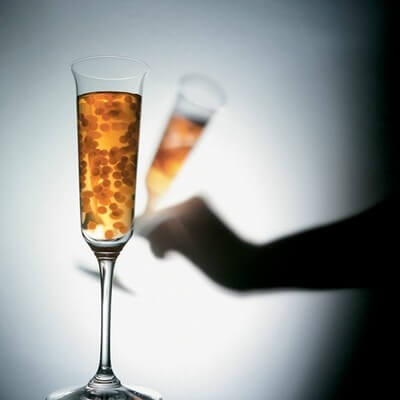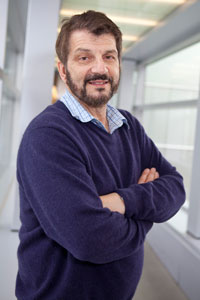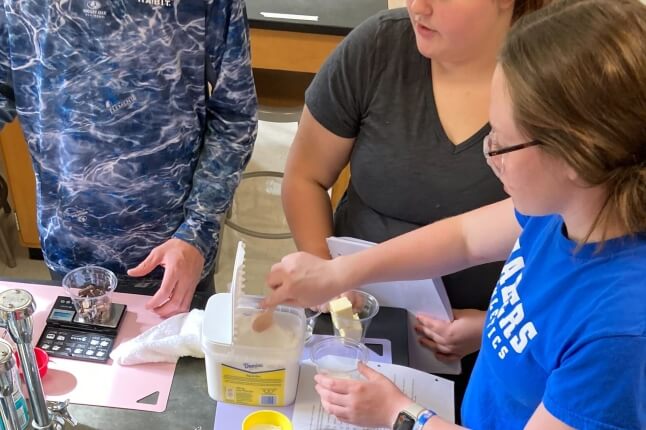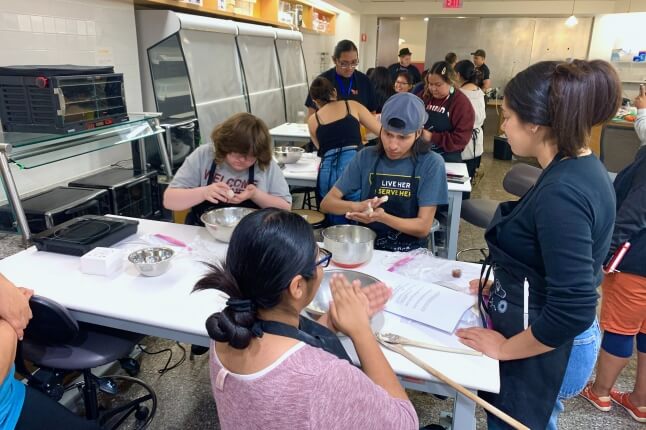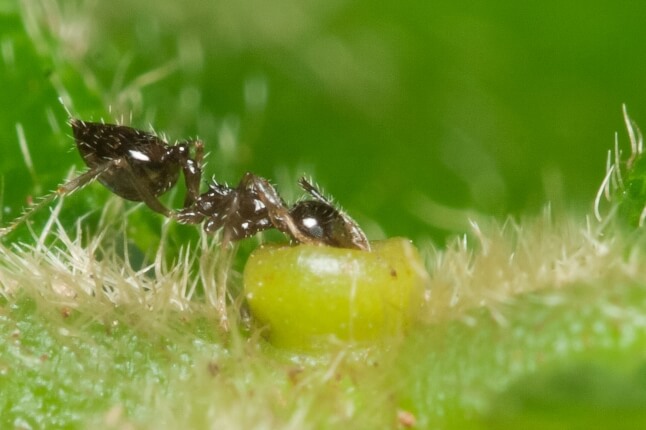News
BARCELONA, Spain and CAMBRIDGE, Mass. - March 22, 2010 — A collaboration by the Foundation Alícia (Alimentació i Ciència), headed by internationally acclaimed chef Ferran Adrià of El Bulli fame, and the Harvard School of Engineering and Applied Sciences (SEAS) has led to the creation of a new undergraduate course on science and cooking.
Debuting in the fall of 2010, “Science and Cooking: From Haute Cuisine to the Science of Soft Matter,” will be part of the new program in General Education at Harvard College. The course will bring together eminent Harvard researchers and world-class chefs, including Wylie Dufresne of wd-50 and Dan Barber of Blue Hill, as well as food scholar and writer Harold McGee, one of the leading authorities on kitchen science.
“Cooking provides an ideal framework to study a variety of complex phenomena—from basic chemistry to materials science to applied physics—through something familiar to all students: food,” says one of the Harvard course organizers, David A. Weitz, Mallinckrodt Professor of Physics and of Applied Physics in SEAS and the Department of Physics at Harvard. “In fact, much of what we do in the lab is what chefs like Ferran Adrià are now doing in their kitchens.”
Adrià is considered a pioneer of exploiting scientific principles to push the limits of modern cuisine, manipulating the physical and chemical processes of cooking by using substances such as hydrocolloids, or “gums” that enable a delicate fruit puree to be transformed into a dense gel, and deconstruction techniques like spherification, creating a resistant skin of liquid (as in a pea soup held in a pod of nothing more than itself).
“The course at Harvard represents one of the greatest aspirations for cooks all over the world,” says Adrià. “It is a unprecedented privilege that cooks will be able to explain how they cook in an academic setting and learn from Harvard faculty and students. I believe this course will be instrumental in fostering and energizing the relation between science and cooking.”
In addition to Weitz and Adrià, the team behind the class includes José Andrés, an innovative Spanish chef with restaurants in Washington D.C. and Los Angeles; Michael Brenner, Glover Professor of Applied Mathematics and Applied Physics in SEAS; and two postdoctoral researchers in SEAS, Amy Rowat (who has written and lectured on science and food) and Otger Campàs (who has worked alongside Adrià in the kitchen).
Twelve world-class chefs and food experts, noted for both their culinary and communication abilities, have been invited to participate in the course. Each guest speaker will give a lecture on cooking that will then provide the basis for a parallel lecture on the underlying science given by the Harvard researchers. In addition, enrolled students will participate in a demonstration “cooking lab” designed to illustrate the techniques up-close.
The invited lecturers will also collaborate with the faculty organizers to deliver an ancillary lecture, focused on the artistry of gastronomy with the science of food, to the broader Harvard community. Finally, the chef-faculty team expects to create a rigorous textbook that will provide a reference for both cooks and scientists alike.
“The creations by the chefs will be the inspiration for introductory, but demanding, classes on soft matter science, covering topics ranging from foams and emulsions, to gelation and polymer melts, among many others,” explains Weitz. “By bringing chefs into the classroom, students will have an amazing opportunity to learn from some of the most creative and innovative professionals in the world today.”
###
Supplemental Materials
About the Course, Science of the Physical Universe 27, “Science and Cooking: From Haute Cuisine to the Science of Soft Matter”
Organizers: Dave A. Weitz, Michael Brenner, Otger Campàs, Amy Rowat, Ferran Adrià, José Andrés
Tentative Guest Instructors: Ferran Adrià, José Andrés, Harold McGee, Joan Roca, Carme Ruscalleda, Carles Tejedor, Enric Rovira, Grant Achatz, Nandu Jubany, Wylie Dufresne, Bill Yosses, and Dan Barber.
Summary: The course is part of the General Education Program intended for Harvard undergraduate students from all concentrations. The course provides an introductory, but demanding, overview of the science of soft matter, covering topics ranging from foams and emulsions to gelation and polymer melts.
Format: The course will have two 2 hour meetings each week. In the first meeting, David Weitz and Michael Brenner will give a 45 minute introduction to the scientific theme for the week. The invited chef will then give a 1 hour lecture. The last fifteen minutes will consist of give and take on scientific content between the faculty, the class and the chefs. The second class each week will be for two hours and focus on the science; this will include both lectures on the science as well as demonstrations.
Each week there will be a section of ~1.5 hours, perhaps taking place in a kitchen, in which a teaching fellow will lead teams of students through scientific exercises. The intent will be to have students answer questions that will be formulated and posted beforehand on the science of the week. Examples include (a) why certain substances stabilize an emulsion (e.g. making and explaining the physics of vinaigrette salad dressing), or (b) understanding why McDonald’s ice cream maintains its shapes even when it warms, or (c) understand the scientific underpinnings of carmelization. Each team of students will be required to prepare a response to this question: we are thinking of experimenting with the form of the response, allowing responses that are written, artistic or video.
Tentative Syllabus
1st session: “Historical overview of the relation between science and cooking”. Main movements in the history of cooking; People that contributed to explain cooking from a scientific perspective; Most celebrated contributions; Understanding of cooking through science; Scientific method; Using scientific knowledge to improve and explore new kinds of cooking.
2nd session: “Simple materials: Fluid and solid states”. Water as an example: ice to liquid to vapor; Parameters that determine the state (phase) of the material: pressure, temperature, density (composition); Transitions between states (freezing, boiling); Concept of thermal energy; Examples: Pressure cooking and steaming.
3rd session: “Basic units (composition) and energetics of food”. Basic units: atoms to simple molecules to macromolecules – the concept of a polymer; sugars to carbohydrates and cellulose; fats (oils; saturated and non-saturated fats); amino acids to peptides and proteins; enzymes.
4th session: “Texture, viscosity, mouth feel - Basic rheology”. Rheology of fluids and solids. How thickeners work. Viscoelastic properties of polymer melts. Examples: From flour to starch; rheological properties of bread dough; effect of polysaccharides on viscosity, e.g. guar gum, Xanthan gum (the super thickener).
5th session: “Cooking time - Non-equilibrium processes”. Heat transfer through food: diffusion, convection, radiation (difussion of light; leiden-frost effect). Fast vs. slow cooking. Effect of kinetics processes on the texture of food. Science of chocolate. Crystal size matters for texture, e.g. bloomed chocolate.
6th session: “Self-assembling structures: surfactants & micelles, crystals, colloids and polymer melts”. Interfaces. Examples: Micelles in milk, gluten network in bread.
7th session: “Foams and emulsions - Introduction”. What is an emulsion and a foam; Coarsening and the concept of stability; Examples: Vinaigrette sauce and sauces in general, mayonnaise, whipping cream, meringue.
8th session: “Gelation”. Gelation as a transition between states. Ways to form a gel: covalent linkage, electrostatics, etc. From gelatin to agar; Alginate ; Examples: Cheese; warm gelatin.
9th session: “Complex Phase changes”. Frying; Caramelizing and the Maillard reaction. Oxidations. Packing.
10th session: “Foams and emulsions – Advanced concepts”. How to stabilize foams and emulsions; Emulsifiers (Lecithin); How to stabilize without egg: culinary foams; surfactants; Example: Culinary foams (“airs”).
11th session: “Fermentation and microbial modifications of food”. How microbes change the structure (texture) and flavor of food. Examples include: Gas: Bread, emmenthaler cheese; Lactic acid: cheese, yogurt, pickles; Polysaccharides: Natto, xanthan gum; Enzymes: Natto, cheese; Wine and beer (yeast).
12th session: “Neurobiology of taste, smell and the feel of textures. How do we sense what we eat?”. Basic flavors; Perceptions: taste, texture, and smell; solubility & volatility; Taste receptors; Example: Miracle berries contain proteins that bind to sour receptors, making lemons taste sweet.
About the Harvard College Program in General Education
Harvard has long required that students take a set of courses outside of their concentration in order to ensure that their undergraduate education encompasses a broad range of topics and approaches. The Program in General Education seeks to connect in an explicit way what students learn in Harvard classrooms to life outside the ivied walls and beyond the college years. The material taught in general education courses is continuous with the material taught in the rest of the curriculum, but the approach is different.
These courses aim not to draw students into a discipline, but to bring the disciplines into students' lives. The Program in General Education introduces students to subject matter and skills from across the University, and does so in ways that link the arts and sciences with the 21st century world that students will face and the lives they will lead after college.
Students must complete one letter-graded course in each of the eight categories in General Education:
* Aesthetic and Interpretive Understanding
* Culture and Belief
* Empirical and Mathematical Reasoning
* Ethical Reasoning
* Science of Living Systems
* Science of the Physical Universe
* Societies of the World
* United States in the World
The new course, “Science and Cooking: From Haute Cuisine to the Science of Soft Matter,” will be part of the Science of the Physical Universe category. General education courses in the Science of the Physical Universe teach central facts and concepts in the physical sciences and engineering, and relate them to issues that students will encounter in their daily lives. These courses are not necessarily intended to produce budding scientists or engineers, but rather to provide a firm grounding in knowledge about the physical world and to promote scientific literacy. General education courses in this category should therefore convey material that is broadly applicable to life after college. (www.generaleducation.fas.harvard.edu)
About the Collaboration between Alícia and the Harvard School of Engineering and Applied Sciences
The genesis of the collaboration began during a highly successful visit by Ferran Adrià to Harvard in December of 2008, where he toured engineering labs, guest taught a course, and gave a public talk on the art and science of cooking. On the final day of his trip, a memorandum of understanding (MOU) was established through the Harvard University Materials Research Science and Engineering Center (MRSEC), based at the Harvard School of Engineering and Applied Sciences (SEAS), and Adrià’s foundation, Alícia, to push advances and promote education in cooking and science. A copy of the MOU is available upon request.
About the Alícia Foundation
Alícia (short for the Fundació Alícia, Alimentació i Ciència [Alícia Foundation, food and science]), is a non-profit organization, established in 2004, focusing on technological innovation in kitchen science and the dissemination of agronourishment and gastronomic heritage. It has a clear social mission in that it is open to the public, and is aimed at promoting good nourishment. The foundation was created by the Generalitat de Catalunya and CaixaManresa with a Board of Trustees headed by chef Ferran Adrià and consultancy services provided by the cardiologist Valentí Fuster.
About the Harvard School of Engineering and Applied Sciences
The Harvard School of Engineering and Applied Sciences (SEAS) serves as the connector and integrator of Harvard’s teaching and research efforts in engineering, applied sciences, and technology. Through collaboration with researchers from all parts of Harvard, other universities, and industry, SEAS brings discovery and innovation directly to bear on improving human life and society in the 21st century.
Topics: Cooking
Cutting-edge science delivered direct to your inbox.
Join the Harvard SEAS mailing list.
Scientist Profiles
David A. Weitz
Mallinckrodt Professor of Physics and of Applied Physics
